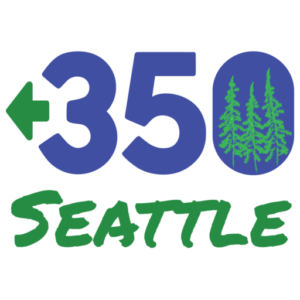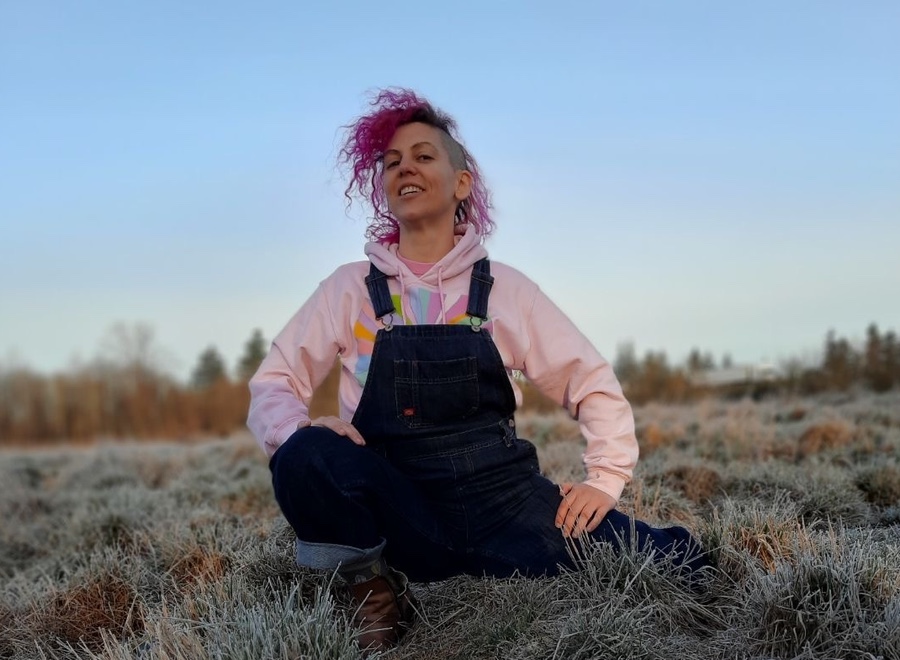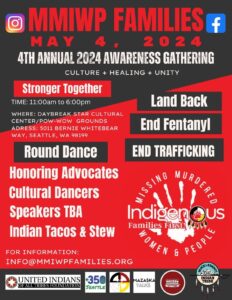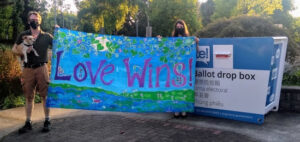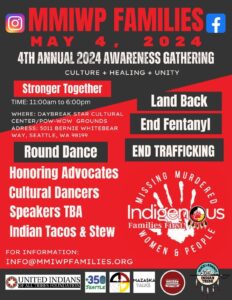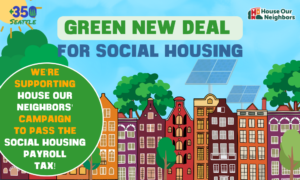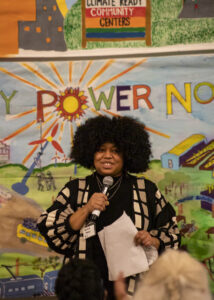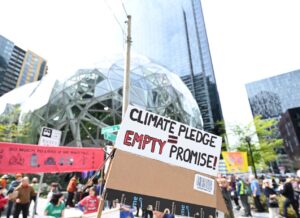Grace Hope is our new Leadership Development Director and the 350 Washington Network Facilitator.
Q: What was your first visceral awareness of the scope of the climate crisis?
A: I feel like it took me a long time to realize that the many crises around me – industrial pollution and exploitation of the land and water, systemic racial injustice, species decline and extinction, and destruction of indigenous communities – were all connected to the climate crisis.
It wasn’t until early 2018 that I finally made the connections between these issues and the climate crisis. I learned about the Keystone XL Pipeline and the swath of missing and murdered Indigenous women that these kinds of pipeline projects leave in their wake because I was getting connected to 350 Tacoma and 350 Seattle, and finding out about the fossil fuel injustices happening right here in my region.
I also learned about the IPCC report during that time, and about the profoundly brief window of time we have to collectively act before global climate breakdown is inevitable. I was in school earning my degree when that report came out, and I was following a lot of scientists and also social and racial justice activists and organizers on Twitter. Writers like Mary Annaise Heglar (@MaryHeglar) and ocean advocates like Dr. Ayana Elizabeth Johnson (@ayanaeliza) really helped me understand how the climate crisis is the culmination of all of these issues, and that we collectively have the power to avert this disaster and build a better world together through systems change.
Until then I had really compartmentalized the climate crisis in my limited understanding of it as “global warming” at the time, as if it was some sort of side issue connected to environmentalism. I didn’t understand it as a form of human on human violence. I definitely didn’t grasp it as a humanitarian disaster whose mechanisms are fundamentally tied to systemic racism and the destruction of BIPOC communities.

Q: Tell us a little about your path to activism.
A: I got connected to 350 Tacoma in a time when I was getting more and more involved in local issues in my community. I met someone from 350 Tacoma at a farmer’s market, handing out flyers about fossil fuel divestment—and I wanted to learn more about what was happening locally. There are some really complex and layered issues here, and Tacoma has a long and brutal history of environmental and racial injustices. Once the global youth-led climate strikes began, I was really lucky to be in a position to help support youth organizers here in Tacoma and Seattle to plan some really kickass events. It was amazing to contribute to the local organizing communities and support young people!
There’s so much learning to do about what’s really going on in our communities, so I’d say I’m still on my path to activism.
Q: What’s most personal to you about the climate crisis?
A: I’m a parent, and it’s definitely the children that make this the most personal for me. I try to keep my heart tender and open to the experience that young people everywhere are having as they gain awareness of the climate crisis, and are impacted by it.
Q: Do you have a particular appetite for any targets we’re not currently working on, or strategies we’re not using (or not using as powerfully as we could)?
A: I’m still getting a sense of what 350 Seattle is up to! I believe that anything that helps us deepen our practice of being in community with others well is strategic. I’ve been thinking a lot about how it takes all sorts of skills and talents and perspectives to build a vibrant and resilient community that can help reawaken and heal the world…and a tremendous shared commitment to examining privilege, unlearning toxic behavior, and engaging in principled struggle with each other. I’m excited to help us grow our shared culture of learning together.
And, even though I’m a scientist and an organizer and a facilitator, I’m also an artist and a musician and a dancer and a creator. I need to express myself artistically to really get at the core of what’s moving within me, and I’d love to see us explore how to set the table for more humans of all sorts to deepen their connection to the climate crisis through artistic expression. And support artists to make brilliant work that opens up all kinds of dialogue and possibilities. 350 Seattle has a couple of amazing teams that focus on art and music, so I’m excited to plug in!
Q: If you could wave a wand and have one major climate policy implemented or decision made in the region, overnight, what would it be?
A: Wow, that’s a pretty amazing magic wand! I live here in Tacoma on the ancestral lands of the Puyallup Tribe, and their traditional, treaty lands and estuaries here in the tideflats are under constant, active threat from the fossil fuel industry. I’d use that magic wand to pass policies that stop fossil fuel expansion in the Port of Tacoma and force the City of Tacoma to honor the treaties and their relationship with the Puyallup eternally. We need to close the Liquified Natural Gas facility and the massive, non-fit-for-humans ICE facility that’s also down there, and reunite all of the detainees with their loved ones. These environmental injustices and atrocities are happening right under our noses in my community and in communities all around the state and the region.
In lieu of a magic wand, I’m going to keep organizing and encouraging others to show up for these issues.
Q: What do you find difficult about this work? Most joyful?
A: The scariest part for me is not wanting to let anyone down while doing work that is emergent and not always easy to plan ahead for. In my role I carry a lot of relationships and I want to keep working towards building trust and following through on my commitments…and hang on to my integrity and my commitment to my values! I’m working on conducting myself as a learner and not an expert. I make mistakes, and sometimes disappoint people around me, and I am grateful that I get to organize with amazing people and learn alongside them. The book We Will Not Cancel Us by adrienne maree brown was a huge revelation for me, and I appreciate her so much.
The most joyful part is also the humans. I love standing together and singing at a direct action, and bringing meals to those locking down or occupying a space in protest. I love coming up with icebreakers in meetings that really draw people’s hearts towards each other, and helping us get silly on Zoom. I am a matchmaker deep at heart and I get so much joy from connecting people to each other. I love planning really great and fun trainings, and engaging in deep, principled conversations about this beautiful and just world we want to bring about. I get huge joy from conversations that move people from despair and panic into action and community.
Q: What helps to sustain you when you’re feeling overwhelmed or burnt out?
A: Burnout is very real and it can easily undermine all the good I’m seeking to do in my work. I recently finished six years in school and I picked up some very destructive overwork habits from that experience, under the guise of being a “successful” student. I was trying to do it all. During school I was also serving as a commissioner with my city while helping to run 350 Tacoma and serving as a student senator, club president, and tenure committee member to help make my campuses better for my fellow students, all while becoming a single parent and managing chronic pain and illness.
It’s not a pace I can keep up, and I’m seeking out practices and learnings that set me up for healing and building sustainable and transformative connections with other humans. The climate crisis will not be solved by a handful of super activists cranking out more Google docs. (We have that, so it would already be solved if that were the case!)
A big part of moving away from burnout-inducing behavior has been identifying and honoring my whole self — as an artist, singer, songwriter, and creator, as a dancer, as a spiritual being, as a living physical body that contains chronic health issues. I gotta make room for all of that in my day or I will become a Zoom zombie!
I have a daily meditation and movement practice that keeps me honoring and caring for my own vessel in all its messiness. I also take lots of breaks to jump on my mini trampoline and lie in the yard, and to tutor my kids and pet my dogs. I work remotely and haven’t been able to leave home much during the pandemic, so keeping a playful spirit has been essential for staying mentally well.
I also enjoy walking down to the waterfront in the early mornings before work to sit and meditate at the beach and watch the sunrise.
Q: We know that where people live (urban or rural, apartment or house) shapes not only their lives, but their climate impact. What’s your ideal living situation, if practicality is no concern?
A: That’s a tough one! I grew up in the countryside on a lot of acreage with animals, and have lived in cities for the past 20 years. I love the incredible human connection that’s possible in cities and the richness of art and culture and nightlife, and the political and creative spaces that we can build together. I get a lot of my joy from my proximity to humans, so living far out in the woods doesn’t have a lot of appeal to me these days, but I also need regular time with the ocean and the woods and open spaces to feel right in my head and body and mind in the city.
I also grew up living communally and was later part of an intentional community here in Tacoma for several years, but now I live alone in a house with my children. I think a lot about alternative ways of practicing community with others as a path towards living out my values of interconnectivity. My chronic health challenges over these past several years have made living independently pretty challenging, and I do think about what kinds of community structures could help me truly thrive. Who knows what the future holds for me, but one fun dream would be a shared household in the city near public transportation, with a garden, and with other queer activists who love to dance and perform and create art.
Q: Anything else you’d like to share with us?
A: It’s an incredible honor to carry this role with 350 Seattle and the 350 WA Network. I believe deeply in the transformative power of this moment. People everywhere are awakening to the reality that we are all caught in these interlocking webs of powerfully corrupt systems that benefit a very small number of corporate executives. Each of us has some kind of access, some kind of privilege, some kind of lever we can pull to overturn these systems, and when we do so collectively, there is no limit to our power. We spend a lot of time focusing on what we are trying to stop and prevent, and it’s great to spend time dreaming and imagining the beautiful and just world we are building towards!
I always like to remind people, if you are feeling shame because you don’t recycle or drive an electric car or do the consumer side of things perfectly, remember that it’s fossil fuel corporations and our extractive, white supremacist capitalist industries that want you to feel that shame. They pretend that we can climb our way out of this mess through better consumer choices and not through radical, justice-centered systems change and getting into right relationship with life and with each other.
